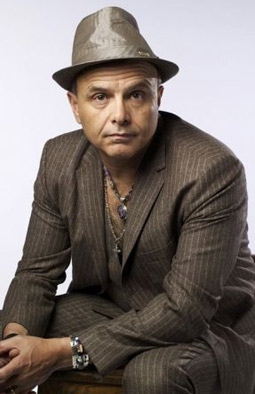
In Joe Pantoliano’s recently released documentary film, No Kidding, Me Too!, the acclaimed character actor opens up for the first time about his own battle with clinical depression, manic episodes and addiction. In No Kidding, Me Too!, Pantoliano candidly documents his own episodes caused by undiagnosed and untreated mental illness through on-camera confessionals and interviews with his wife Nancy and their children. Rounding out the film are the gritty stories of some everyday men and women who bare all to Pantoliano about their own struggles with everything from schizophrenia and bipolar disorder to cutting and heroin addiction. No details are spared in this eye opening look through the eyes of those who are living with various forms of mental illness or brain disease. However you choose to label it, its affects can be devastating, not just on the sufferer, but on their loved ones as well.
No Kidding, Me Too! takes a candid look inside the emotional and behavioral world of people who are living with bipolar disorder, clinical depression, schizophrenia and addiction as Pantoliano, himself, shares his own intense battle with mental “dis-ease” as he prefers to call it. The purpose for this film, Pantoliano insists, is to remove the long-held stigma associated with various mental illnesses and emotional disorders and to create an ongoing open dialogue to abolish shame.
Known for chameleon-like transformations on the big and small screens, Joe Pantoliano or “Joey Pants” as he is known among friends and industry colleagues, spent years lost in a fog of emotional turmoil. He secretly rode a rollercoaster of mania, depression and compulsive addictions that culminated in the near alienation of his family. Though Pantoliano’s less than balanced mental state surely fueled his ability to slip inside even the most disturbing and complex of characters, his undiagnosed condition wreaked personal havoc.
As Joe Pantoliano explains it to me throughout our discussion, talking about his illness is what sustains his recovery, a recovery that still appeared a bit shaky to me throughout our interview. Whatever your opinion after reading this interview, Pantoliano’s foundation, No Kidding, Me Too (www.nkm2.org) and its corresponding film, is a step towards opening up communication about a condition that has seen millions suffer in silence for far too long.
PR.com (Allison Kugel): There was a comment you made in a voiceover at the beginning of your documentary film, No Kidding, Me Too!. You said you “were born with a hole in your heart the size of God.” Explain.
Joe Pantoliano: There’s been an emptiness inside of me that I thought was unique. I had no idea that there were millions of souls in the world that felt this and that it’s a very common feeling. I thought it was mine and that I owned it, and I was responsible for it. The idea that, you know, they [refer to] a drug as your “drug of choice,” where people are self medicating; the catch phrase is “drug of choice.” If I had a series of choices to self medicate the first one was food. I would eat whenever I was in despair or aggravated. And I also have Attention Deficit Disorder, ADHD, so sounds will take my attention away from things.
PR.com: But that was left undiagnosed when you were growing up.
Joe Pantoliano: I had no idea. I found out about two years ago. After I was diagnosed with clinical depression I started looking at my life in a cognitive way under the aid of the psychiatrist, and I was finding all of this post-traumatic stress that led my life, that lived inside of me; traumatic events in my life that were so upsetting that I would store them away and I would forget that they happened. And then if I had any memory at all I would remember them in a humorous way. So everything was funny. My mother was funny. My mother was crazy, funny, harmless, lovable…
PR.com: But she was actually clinically depressed like you?
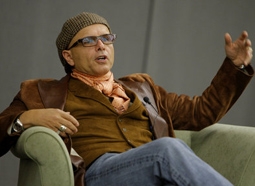
Joe Pantoliano: My mother was bipolar, undiagnosed. My mother’s drug of choice was cigarettes, 4 packs a day, and coffee! I don’t recall watching my mother eat as much as I remember her smoking and drinking coffee with three spoons of sugar. I just wanted to feel different and food made me feel different, and then I got so fat that people would make fun of me. I wanted to be accepted and liked. When you’re fat it’s a calling card to be bullied by miserable kids, kids that want to be better than you and feel better than you because they were victims of bullying themselves. Even in my community (Pantoliano grew up in Hoboken, New Jersey) there was unintentional racism. The Irish felt better than the Italians and the Italians felt better than the Puerto Ricans. My mother used to say, “Yeah, we’re broke but at least we’re not living in the projects.”
PR.com: On top of all of that, when you were in school people weren’t as aware of clinical depression or learning disabilities like ADHD. I don’t even think that they had a proper name or a set diagnostic procedure for dealing with students with learning disabilities.
Joe Pantoliano: I was dyslexic; I didn’t know how to read. I grew up having teachers telling my mother there’s nothing wrong with him, he’s just lazy. They said, “Joey’s not a bad kid, he’s just lazy. He doesn’t want to do his work.” I wanted to do the work and I was making myself sick. My first book, Who’s Sorry Now, deals with all of that.
(He begins to split off into character as he describes and acts out the inner workings of his large family and its cast of eccentric characters.)
PR.com: Right now you just went somewhere. It’s like you’re slipping into character. It’s interesting because in your film, No Kidding, Me Too! you say, “I wanted to be an actor so that even after I was gone people would know that I existed. There would be evidence that I existed.” I’m guessing that inside you felt like you weren’t too sure if you existed or if you mattered to anyone. Is that fair?
Joe Pantoliano: Yes, it’s very accurate. But I felt like… there’s not going to be a building named after me. There’s not going to be an event. I’m not going to become an astronaut or find a cure for cancer. What would be achievable is that I could become an actor and there I would be, for centuries.
PR.com: So there it is, it’s documented. Joey Pantoliano, he existed.
Joe Pantoliano: Right. And then 9/11 happened and I’m born September 12th…
PR.com: Me too!
Joe Pantoliano: Get out?!
PR.com: I swear. That’s my birthday. Two crazy Virgos!
Joe Pantoliano: I was about to turn fifty [in 2001] and they were going to have a big surprise party. We were flying to LA and I missed my birthday, of course, as you did. Nobody was celebrating birthdays at that time. Have you ever been able to really enjoy your birthday since 9/11?
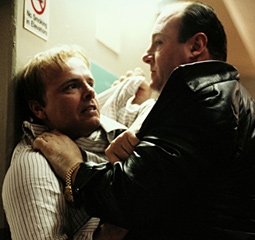
PR.com: Yes. I go to a Broadway play with my family every year on my birthday. It’s a tradition for me. And a couple of years after 9/11 we could only get the tickets we wanted on September 11th instead of the 12th, and someone in my family said to me, “Are you sure we should go on the 11th?” And I said, “Yes, of course we should go. We’re alive and we’re allowed to celebrate.”
Joe Pantoliano: That’s awesome. I feel like I can never enjoy my birthday again. Three of my friends were killed in the building. But, generally speaking, the best description of clinical depression would be, if most people won a million dollars they’d go, “Oh my Gosh, I won a million dollars! What am I going to do with it? I’ll buy my father that house he never had. I’ll buy my mother that car she always wanted!” But a guy with clinical depression is going, “It’s not gonna be enough. What am I gonna do? The taxes are gonna take all of it. My brother’s gonna want money. This is such a burden.”
PR.com: That’s the story you’re telling yourself?
Joe Pantoliano: Everything is a burden. It’s hopeless. When 9/11 occurred all I could think about was my children. How am I going to protect them? How is the economy going to support them? Kids are coming out of college and they can’t get a job now. Everybody’s working for 40% less than what they used to be making and I’m getting too old to be able to [help]. I didn’t make enough for my entire family, for my children’s children and for their children to survive. I was stuck living in the future and I was miserable.
PR.com: You weren’t living in the present at all. But during that time, post 9/11, you were starring on The Sopranos.
Joe Pantoliano: Yeah, and I won an Emmy Award.
PR.com: You weren’t enjoying that time in your life?
Joe Pantoliano: No! I got the Emmy and I’m going, “That’s it? This was supposed to feel better.” It was supposed to mean something. I left it on the floor of the car. It didn’t give me the feelings that I thought this life that I dreamt of was supposed to be. I imagined a life beyond my wildest dreams. I would watch Johnny Carson and I would watch the Academy Awards, and I would dream that I would get my chance, that I would be up there and I would win this honor and my life would be completely different.
PR.com: And there you were on the most popular and most talked about television show at the time, you’re playing a great character. And…
Joe Pantoliano: … And I was in my bedroom thinking, “What’s wrong with me? Why do I feel this way? Why am I numb? Why can’t I feel anything?” I couldn’t even feel the love of my own children. I was miserable and I was complaining all the time. Now, looking back, because of the benefit of therapy I realize that I was so sad inside that I needed all of the people who loved me to be as sad as I was. I had nothing but disdain for my wife because she cared for me. I didn’t want to be around anybody who wanted to have me in their lives.
PR.com: If your wife tried to give you love or tried to comfort you, did it enrage you? Did it make you dislike her even more?
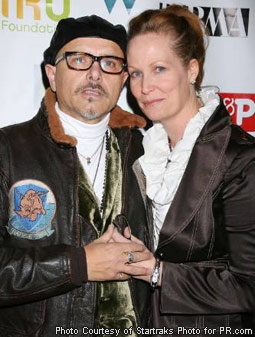
Joe Pantoliano: I just couldn’t feel anything. I felt numb. It took on a physical personality. There are a lot of behaviors surrounding mental un-easiness: food, sex, alcoholism, cutting. The cutters that I interviewed, they say they cut themselves because it makes them feel alive. A feeling of euphoria came over them, because when the body kicks in to go stop the bleeding the brain has to produce dopamine. Everything happens in the brain. I thought my soul and my heart and my feelings lived here (pointing to his heart). No, it comes from [the brain], much of it right here in the prefrontal cortex. So anytime I could make [my brain] feel good, it didn’t matter what it was, and too much was never enough.
PR.com: Was there anything that made you feel happy or whole just for a fleeting moment?
Joe Pantoliano: That first drink filled it. The new car, the new suit, the new hat that I didn’t need… all of these things that I bought that I didn’t need. I tried to fill my life with things, and I don’t think this is unique in any way. A lot of studies tell us that gambling addiction is not about winning, it’s not about losing. It’s about the rush of, “What’s the answer? What’s it gonna be?!” And with me it was the same thing. I took tremendous risks. I risked everything.
PR.com: Family?
Joe Pantoliano: Yes, family. I cheated on my wife every chance I could.
PR.com: Has she forgiven you?
Joe Pantoliano: She forgave me. It wasn’t like, “Ok, I forgive you.” I almost lost everything. It took her years to forgive me.
PR.com: When exactly did you get diagnosed with mental “dis-ease” as you call it? When were you told, “Joe, you have clinical depression and you need treatment?”
Joe Pantoliano: It was around 2006, 2007.
PR.com: And what does your treatment consist of, exactly?
Joe Pantoliano: I do talk therapy, I take pharmaceuticals, abstinence…
PR.com: Sexual abstinence?
Joe Pantoliano: Well, abstinence from having sex with strangers, and abstinence from alcohol. But I stopped drinking alcohol and I became addicted to pain pills, I went into rehab for the pain pills and I put on 40 lbs. from overeating. Then I started my diet and I put myself and my family in debt because I was overspending. It continues. I’ve got to work diligently to live my life in a balanced way. By sharing my story with other people I’m hoping that they’re thinking, even if they don’t have the courage to say it, “My God, he’s talking about me!” Or, “That’s what my brother was like, my sister was like, my mother was like.”
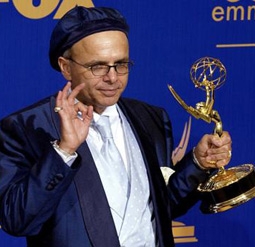
PR.com: How did you get some of these other people to take part in your film and to come forward with their own stories about mental illness? You interviewed one young girl about her cutting, and you interviewed another young woman who said she was depressed and she coped by shoplifting and shooting up heroin. These people have to now go out into the world and they don’t have that celebrity status as a shield to back them up. Why would they agree to appear in this film and to tell their stories to potentially millions of people?
Joe Pantoliano: They know that by being open and honest, we’re talking about emotional sobriety, and emotional intimacy. We know what it was like to want to die that bad. When Casey (one of Pantoliano’s interview subjects in “No Kidding, Me Too!”) says she was shooting heroin and I asked her why she would beg someone to put heroin in her arms, she said, “Because nothing else worked. Nothing worked!” Even if the heroin would make the pain stop once, just once, it was worth it to her. So the reason why we talk about this is because this is stopping the pain. Me talking about my feelings, by me giving it away and sharing it, it is just like me doing a good performance. It’s also like when, from my lifetime as an actor, it was those feelings that were evoked in me when I heard somebody laugh or if I could be in a sensitive scene and I could hear somebody sniffling…
PR.com: You had the ability to create an emotional reaction in people.
Joe Pantoliano: Exactly. That is more powerful than a truckload of morphine. It’s that feeling, to be able to make a difference. This cause “No Kidding, Me Too,” we mean business. We are not interested in pretending that we’re better. We are clearly just saying that if this doesn’t work we’ll be humiliated, and those girls won’t be able to get married because somebody’s going to say, “You can’t marry her, she was in this movie.” I didn’t get anybody to talk. They wanted to talk, they needed to talk. Some say that religion is when people are so afraid that they pray to God because they’re afraid of hell. With people who have clinical depression or some kind of brain disease, we’ve been to hell, and we don’t want to go back.
PR.com: And for you, talking and sharing, this exchange back and forth, this is what does it for you.
Joe Pantoliano: It fuels me. It makes me feel alive, it makes me feel like there’s hope and it gives me a reason to go on. It’s brought me close to a spiritual connection so I understand that this was supposed to happen. I had to come to the end of my rope to find a new doorway. I was at a point where I didn’t want to live anymore. It was when I surrendered to the idea that I was sick and that I had this mental disease.
PR.com: What are you hoping people will get out of your documentary film, No Kidding, Me Too!? Obviously, they’ll be more informed about mental illness, or dis-ease, and how it manifests. But aside from that, how do you hope your film and your organization (NKM2.org) will begin to spin things in a different direction?
Joe Pantoliano: When other people start looking at mental disease as a subject that is cool and trendy, and when kids are proud of their sensitivity. It is what put you in that chair and what put me in this chair; the idea that you want to make a difference. When I won the Emmy Award and I was up on that stage and I’m looking at all of these famous people, some that have inspired me and some were colleagues, and I could see the happiness in their eyes. They were happy for me, but it wasn’t enough. And I was ashamed of myself. I felt shame.
PR.com: Shame because it felt glutinous? What kind of shame?
Joe Pantoliano: It was a shame that I still had this secret inside of me. So I went out and put a load on. But now I don’t have that shame anymore. I have a light inside of me. That light was out. When the therapy began and I was taking my medication, my [wife], one morning she came to bed and was giving me a hug goodbye and for the first time I could feel something. I could actually feel warmth and love. She was going to leave and I said, “No, don’t,” because I was beginning to feel things again. Also, I don’t put on airs like I used to. How I’m feeling is how I’m feeling. But then at work when somebody says, “action” I know what I’m doing. I know what to do.
PR.com: That’s when you are at your best, when somebody says, “Action!”
Joe Pantoliano: In between “action” and “cut” I realized that it was the only time in my life, ever, that I knew what I wanted. I had prepared, I knew what my objective was, I knew who my character was, I knew who I was, I knew what I wanted and I knew how I was going to go out to get it. Then the guy would say, “Cut!” and I’d go back and do it again until I got it right.
PR.com: But you can’t do that in real life.
Joe Pantoliano: Nope (laughs). Remember when my wife said that?
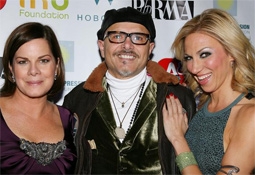
PR.com: Yes. She said that you wished that was what your life was like. She said you would have a script written in your mind of how things should go, and if you came home and your wife and kids didn’t follow your script you would go ballistic.
Joe Pantoliano: Yeah, and it’s like, “No good. You’re doing it wrong! Cut! Let’s do it again.” The only people in my life that were doing it right were the dogs.
PR.com: Which is why you kept getting so many dogs…
Joe Pantoliano: Yeah, they came running when daddy was home; four dogs running to see me, ten dogs running to see me and showing their love. Then I realized they were also doing it with the mailman.
PR.com: (Laughs.) And with your website (nkm2.org), which seems to be the base of your foundation, how did you recruit all of these celebrities like Harrison Ford, Chazz Palminteri, Bonnie Hunt, Anthony Edwards and Jason Ritter to appear in the promo video and to speak out about mental illness, or mental dis-ease, as you call it?
Joe Pantoliano: They all did it because they believe in the cause, they believe in the simplicity of the action and they all have someone that they love who is suffering.
PR.com: So the bottom line is, No Kidding, Me Too. I have a similar problem, or my loved one has a similar problem, and it’s ok to talk openly about it.
Joe Pantoliano: That’s right.
Visit nkm2.org to learn about Joe Pantoliano’s movement to remove the stigma surrounding mental illness.
Joe Pantoliano’s documentary film, “No Kidding, Me Too!,” is available for purchase at iTunes.com. For additional videos visit nkm2.org/videos/categories.
